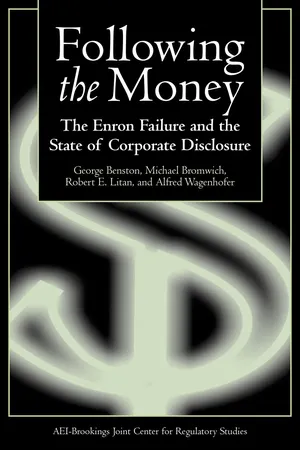
Following the Money
The Enron Failure and the State of Corporate Disclosure
- 126 pages
- English
- PDF
- Available on iOS & Android
Following the Money
The Enron Failure and the State of Corporate Disclosure
About this book
A few years ago, Americans held out their systems of corporate governance and financial disclosure as models to be emulated by the rest of the world. But in late 2001 U.S. policymakers and corporate leaders found themselves facing the largest corporate accounting scandals in American history. The spectacular collapses of Enron and Worldcom—as well as the discovery of accounting irregularities at other large U.S. companies—seemed to call into question the efficacy of the entire system of corporate governance in the United States. In response, Congress quickly enacted a comprehensive package of reform measures in what has come to be known as the Sarbanes-Oxley Act. The New York Stock Exchange and the NASDAQ followed by making fundamental changes to their listing requirements. The private sector acted as well. Accounting firms—watching in horror as one of their largest, Arthur Andersen, collapsed after a criminal conviction for document shredding—tightened their auditing procedures. Stock analysts and ratings agencies, hit hard by a series of disclosures about their failings, changed their practices as well. Will these reforms be enough? Are some counterproductive? Are other shortcomings in the disclosure system still in need of correction? These are among the questions that George Benston, Michael Bromwich, Robert E. Litan, and Alfred Wagenhofer address in Following the Money. While the authors agree that the U.S. system of corporate disclosure and governance is in need of change, they are concerned that policymakers may be overreacting in some areas and taking actions in others that may prove to be ineffective or even counterproductive. Using the Enron case as a point of departure, the authors argue that the major problem lies not in the accounting and auditing standards themselves, but in the system of enforcing those standards. Rather than attempting to craft a single set of accounting and reporting standards for all companies throughout the world, the authors advise policymakers to allow competition between the two major sets of standards: Generally Accepted Accounting Principles and International Financial Reporting Standards. The authors also believe that the corporate disclosure system needs to be updated to reflect changes in the underlying economy. In particular, they recommend new forms of disclosure for a variety of nonfinancial indicators to better enable investors and analysts to ascertain the source and nature of intangible assets. They also urge policymakers to exploit the advantages of the Internet by encouraging more frequent financial disclosures in a form that will make them more widely accessible and more easily used.
Frequently asked questions
- Essential is ideal for learners and professionals who enjoy exploring a wide range of subjects. Access the Essential Library with 800,000+ trusted titles and best-sellers across business, personal growth, and the humanities. Includes unlimited reading time and Standard Read Aloud voice.
- Complete: Perfect for advanced learners and researchers needing full, unrestricted access. Unlock 1.4M+ books across hundreds of subjects, including academic and specialized titles. The Complete Plan also includes advanced features like Premium Read Aloud and Research Assistant.
Please note we cannot support devices running on iOS 13 and Android 7 or earlier. Learn more about using the app.
Information
Table of contents
- Cover
- Title Page
- Foreword
- Contents
- Chapter 1. The Crisis in Corporate Disclosure
- Chapter 2. What's Wrong--and Right--with Corporate Accounting and Auditing in the United States
- Chapter 3. Fixing Corporate Disclosure
- Chapter 4. Disclosure Challenges Ahead
- Appendix: What Are the Major Differences between GAAP and IFRS, and Why Do They Matter?
- Notes
- Contributors
- Index